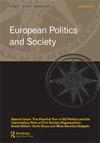英国政治中的情感——对1900-2019年保守党和工党演讲的混合方法分析
Q1 Social Sciences
引用次数: 0
摘要
本文章由计算机程序翻译,如有差异,请以英文原文为准。
Emotion in british politics – a mixed methods analysis of conservative and labour party speeches from 1900–2019
Abstract In recent years, an increasing ‘emotionality’ in Britain’s political discourse has been attested by many researchers and public commentators alike, regularly accusing alleged modern-day ‘populists’ of having caused this emotionalization with their unusual conduct and rhetoric. In these analyses, however, emotional speech is too often conflated with ‘populist’ speech, without offering substantial historical proof to support such claims. To scrutinize this alleged novel emotionalization of the general political discourse in Britain and to historically contextualize the influence that alleged ‘populists’ have had on it, I conducted a comparative, sequential mixed methods study of political speeches from British Labour and Conservative Party leaders (quant → QUAL), performing a manual neopragmatist discourse analysis as well as an automated dictionary analysis. With this approach, I was able to determine the distinct argumentative characteristics of the speeches and explore the discourses’ emotional quality, reporting a multitude of qualitative and quantitative differences as well as similarities between the two parties. Thus, the paper offers a (historical) overview of the general employment of emotion within political speech and consequently, argumentation used by British politicians. These findings are then used to contextualize claims about the influence that alleged ‘populists’ have had on the emotionality of recent politics.
求助全文
通过发布文献求助,成功后即可免费获取论文全文。
去求助
来源期刊

European Politics and Society
Social Sciences-Political Science and International Relations
CiteScore
4.20
自引率
0.00%
发文量
35
期刊介绍:
The editors of European Politics and Society welcome the submission of high quality articles on all aspects of European Politics, widely defined to include, comparative politics, political sociology, social policy, international relations, security, and modern history. The geographical scope of the journal covers all parts of Europe including the Russian Federation. The Journal also welcomes proposals for special thematic issues. For further guidelines on submission of special issue proposals, please see the Instructions for Authors page. All articles will be subject to a rigorous double-blind peer review process by a minimum of two referees.
 求助内容:
求助内容: 应助结果提醒方式:
应助结果提醒方式:


